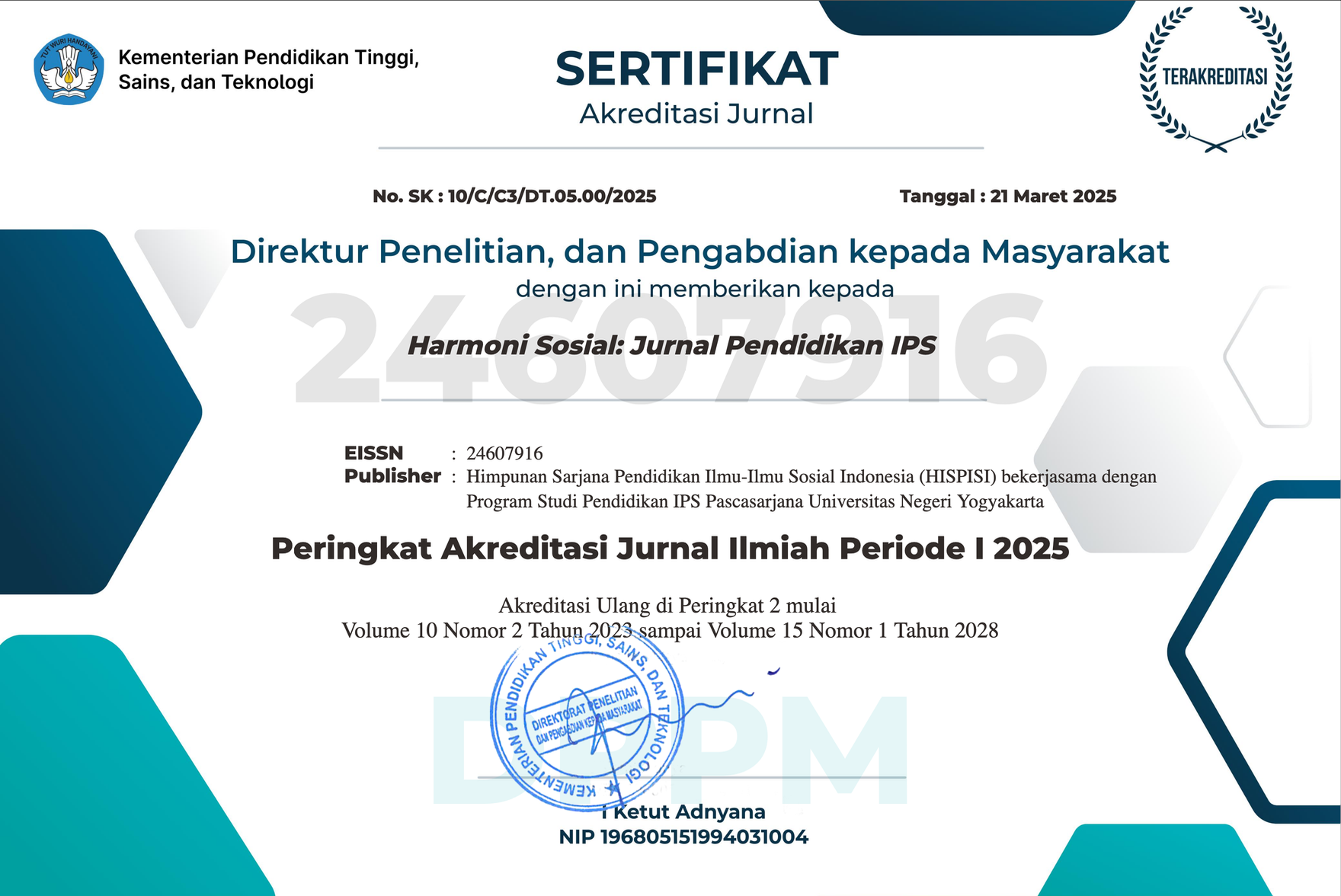The effect of CTL learning model and learning style on the historical learning outcomes
Downloads
Downloads
Agustiya, F., Sunarso, A., & Haryani, S. (2017). Influence of ctl model by using monopoly game media to the students' motivation and science learning outcomes. Journal of Primary Education, 6(2), 114-119. doi: https://doi.org/10.15294/jpe.v6i2.17559
Choi"Lundberg, D. L., Cuellar, W. A., & Williams, A. M. M. (2016). Online dissection audio"visual resources for human anatomy: Undergraduate medical students' usage and learning outcomes. American Association of Anatomists, 9(6), 545-554. doi: https://doi.org/10.1002/ase.1607
DePorter, B., & Hernacki, M. (2002). Quantum learning: Membiasakan belajar nyaman dan menyenangkan. (Terj. Alwiyah Abdurrahman). Bandung: Kaifa.
Fadillah, A., Dewi, N. P. L. C., Ridho, D., Majid, A. N., & Prastiwi, M. N. B. (2017). The effect of application of contextual teaching and learning (CTL) model-based on lesson study with mind mapping media to assess student learning outcomes on chemistry on colloid systems. In International Journal of Science and Applied Science: Conference Series (Vol. 1, No. 2, pp. 101-108).
Fadillah, A., Dewi, N. P. L. C., Ridho, D., Majid, A. N., & Prastiwi, M. N. B. (2017). The effect of application of contextual teaching and learning (CTL) model-based on lesson study with mind mapping media to assess student learning outcomes on chemistry on colloid systems. International Journal of Science and Applied Science: Conference Series, 1(2), 101-108. doi: https://doi.org/10.20961/ijsascs.v1i2.5128
Gagne, R. M. (1975). Essentials of learning for instruction. Dryden Press.
Gufron, R., & Riswanita, R. S. (2012). Gaya belajar kajian teoritik. Yogyakarta: Pustaka Pelajar.
Hamalik, O. (2010). Proses belajar mengajar. Jakarta: Bumi Aksara.
Hartoto, T. (2016). Model Pembelajaran Kooperatif Tipe Group Investigation (GI) Meningkatkan Aktivitas dan Hasil Belajar Sejarah. HISTORIA: Jurnal Program Studi Pendidikan Sejarah, 4(2), 131-142. Doi: http://dx.doi.org/10.24127/hj.v4i2.553
Kindarto, S., & Gafur, A. (2014). Pembelajaran kontekstual dengan strategi react berbantuan media untuk meningkatkan aktivitas dan hasil belajar IPS. Harmoni Sosial: Jurnal Pendidikan IPS, 1(2), 213-230. Doi: https://doi.org/10.21831/hsjpi.v1i2.2442
Kozub, R. M. (2010). An ANOVA analysis of the relationships between business students' learning styles and effectiveness of web based instruction. American Journal of Business Education, 3(3), 89-98.
Latipah, E. D. P., & Afriansyah, E. A., (2018). Analisis kemampuan koneksi matematis siswa menggunakan pendekatan pembelajaran CTL dan RME. Jurnal Teori dan Terapan Matematika. Doi: https://doi.org/10.29313/jmtm.v17i1.3691
Martin, F., & Ertzberger, J. (2013). Here and now mobile learning: An experimental study on the use of mobile technology. Computers & Education, 68, 76-85. doi: https://doi.org/10.1016/j.compedu.2013.04.021
Muhlisin, A. (2012). Pengembangan perangkat pembelajaran IPA terpadu berbasis Contextual Teaching and Learning (CTL) dengan model pembelajaran kooperatif tipe Student Teams Achievement Division (STAD) tema polusi udara. Journal of Research and Educational Research Evaluation, 1(2), 139-145.
Mulyanto, H., Gunarhadi, G., & Indriayu, M. (2018). The effect of problem based learning model on student mathematics learning outcomes viewed from critical thinking skills. International Journal of Educational Research Review, 3(2), 37-45. doi: https://doi.org/10.24331/ijere.408454
Murtiani, M., Fauzan, A., & Ratnawulan, R. (2012). Penerapan pendekatan Contextual Teaching and Learning (CTL) berbassis lesson study dalam meningkatkan kualitass pembelajaran fisika di SMP Negeri Kota Padang. Jurnal Penelitian Pembelajaran Fisika, 1(1), 1-21. Doi: https://doi.org/10.1234/jppf.v1i1.597
Puji, R. P. N., & Ahmad, A. R. (2015). Gaya belajar dan kemahiran pemikiran sejarah dalam pembelajaran sejarah di peringkat Universitas. Jurnal Ilmu Pendidikan dan Pengajaran, 2(3), 253-263. Doi: https://doi.org/10.17509/edusentris.v2i3.178
Rahman, A. A., & Yanti, S. (2016). Pengaruh gaya belajar terhadap hasil belajar siswa pada mata pelajaran IPS terpadu di kelas VII SMP Negeri 1 Peudada. Jurnal Pendidikan Almuslim, 4(2), 1-6.
Sabri, A. 2010. Strategi belajar mengajar micro teaching. Quantum Teaching.
Sanjaya, W. (2007). Strategi pembelajaran: Berorientasi standar proses pendidikan. Jakarta: Kencana Prenada Media.
Setiawati, N. K., Ramadhan, S., & Gani, E. (2018, December). The effect of contextual teaching and learning model and motivation towards skill of fable text writing. Paper presented at International Conference on Language, Literature, and Education (ICLLE 2018). Atlantis Press. doi: https://doi.org/10.2991/iclle-18.2018.14
Sihono, T. (2004). Contextual Teaching and Learning (CTL) sebagai model pembelajaran ekonomi dalam KBK. Jurnal Ekonomi dan Pendidikan, 1(1), 63-83. Doi: https://doi.org/10.21831/jep.v1i1.673
Sriadhi, S., Gultom, S., Restu, R., & Simarmata, J. (2018, July). The effect of tutorial multimedia on the transformator learning outcomes based on the students' visual ability. IOP Conference Series: Materials Science and Engineering, 384(1).
Syah, M. (2011). Psikologi pendidikan dengan pendekatan baru. Bandung: Remaja Rosdakarya.
The Authors submitting a manuscript do so on the understanding that if accepted for publication, copyright publishing of the article shall be assigned to Harmoni Sosial: Jurnal Pendidikan IPS
 | Harmoni Sosial: Jurnal Pendidikan IPS by http://journal.uny.ac.id/index.php/hsjpi is licensed under a Creative Commons Attribution-ShareAlike 4.0 International License. |









 ISSN Print
ISSN Print









